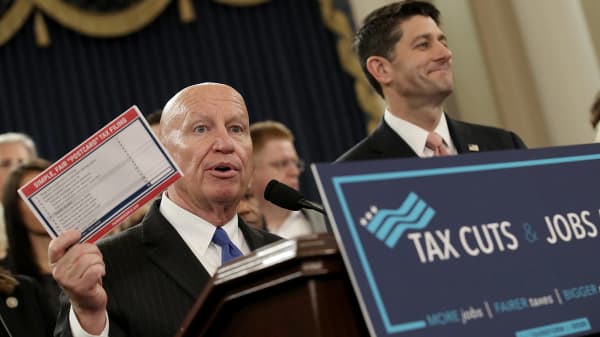With respect to wages, there is scant, if any, evidence that suggests cutting taxes will lead to a hike in take-home pay for workers at any level. History has shown that both temporary and permanent tax cuts that lead to rising corporate profits and widening profit margins most often result in the gains being paid to shareholders in the form of stock buybacks and dividend increases, not given to workers in the form of pay increases.
Companies do not raise wages when rapid technological change is leading to greater automation, lower labor costs and higher productivity.
It's a bald-faced lie that wages will magically rise once corporate tax rates come down.
Indeed, with corporate profits at both cyclical and historic highs, companies have been in no hurry to raise wages, a conundrum that has defied economic orthodoxy.
And, very few people will see a noticeable increase in after-tax income, except for the very wealthy, according to most analyses of the plan. That means the purported acceleration in future economic growth is also an exaggeration.
While the House bill eliminates the deductions for state and local income taxes, it does allow a maximum $10,000 deduction for local property taxes.
That's good news for those who live in low-tax states.
The Senate bill released today eliminates all state and local tax deductions, including those for property taxes. That creates huge disincentives for anyone interested in buying a home in New York, New Jersey, Illinois or California, the biggest and most expensive property markets in the nation.
If the two bills are reconciled and no deductions remain, expect the roof to cave in on the American housing market. There will be ripple effects of some consequence in areas outside the highest-priced markets, as well.
The House bill also eliminates the $13,570 adoption credit, with scant reason. On average, it costs a couple seeking to bring home a bundle of joy up to $50,000 just to go through the adoption process. Further, it costs about $230,000 to raise a child from infancy through age 18, allowing for just food, clothing, shelter and a public school education.
For a pro-life party that would rather see a child given up for adoption than aborted, how on Earth does this punitive measure make sense? The Senate version of a tax reform bill keeps the adoption credit.
Meantime, the elimination of the estate tax, or even the increase in the amount of money that can be passed tax-free from one generation to the next, benefits the offspring of only a very few. And yet somehow Congress prioritizes that over assisting families living paycheck to paycheck, struggling to get by on the median income of $50,900 a year.
In another craven move, repealing the Affordable Care Act without replacing it would cut the federal deficit by nearly $340 billion over the next 10 years, the Congressional Budget Office has estimated, helping to reduce the $1.5 trillion cost of the tax cuts.
Middle-class families, who by most accounts will shoulder the cost of a large corporate tax reduction even without this crude "pay-for," will be hit even harder.
President Trump's top economic advisor, Gary Cohn, blurted out that "the most excited group out there are big CEOs, about our tax plan."
Need I say more?
The money on this faux tax reform would be much better spent on infrastructure, education, job retraining and immigration law reform.
Addressing the actual, over the theoretical and ideological, needs of the economy will help the people who were promised relief by this president. But nothing I have seen about either the House or the Senate version of tax reform fits that bill.
Instead, "average Americans" will, once again, be footing the bill for those far less needy than themselves.





